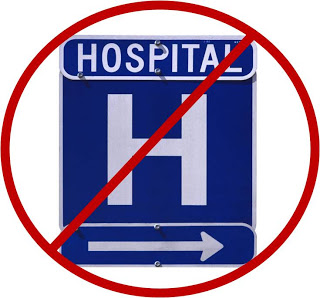By Rose O. Sherman, EdD, RN, FAAN
 Picture a World Without Hospitals was the provocative title to a keynote speech that Dr. Eric Topol gave to hospital executives at an AHA Health Forum conference last week. Dr. Topol is a physician and director of translational sciences at Scripps in California. He is also author of the book The Creative Destruction of Medicine: How the Digital Revolution will Create Better Healthcare. Like many healthcare futurists, he sees a significantly decreased role for hospitals in the healthcare delivery system as technology becomes less costly and healthcare reform is fully implemented. Topol predicts that in the future there will be far fewer hospitals and only patients requiring an intensive level of care will be hospitalized. Future healthcare will be community based and patient focused. Technology and close communication with patients in the home will be a key component of care.
Picture a World Without Hospitals was the provocative title to a keynote speech that Dr. Eric Topol gave to hospital executives at an AHA Health Forum conference last week. Dr. Topol is a physician and director of translational sciences at Scripps in California. He is also author of the book The Creative Destruction of Medicine: How the Digital Revolution will Create Better Healthcare. Like many healthcare futurists, he sees a significantly decreased role for hospitals in the healthcare delivery system as technology becomes less costly and healthcare reform is fully implemented. Topol predicts that in the future there will be far fewer hospitals and only patients requiring an intensive level of care will be hospitalized. Future healthcare will be community based and patient focused. Technology and close communication with patients in the home will be a key component of care.
What the Future Could Look Like
A vision like this may seem shocking to many of us who have spent our lives working in healthcare. Yet even today, many hospitals are already seeing their volume of patients drop with the implementation of the 30 day Medicare readmission penalities. Dr. Topol makes a strong case for his viewpoints and he is highly regarded as one of the gurus in future patient care technology. In a recent interview with Dr. Nancy Snyderman on NBC, he demonstrates how tests that today require a trip to an imaging center will soon be done in the home with handheld equipment. Patients will be able to be closely monitored at home with soon to be available IPhone applications. He believes the future of health lies in our own hands, namely in our smart phones and other portable electronic devices.
According to Topol,“the smart phone will be the hub of the future of medicine. Topol points to a growing number of apps and devices, none of which he is paid for using or endorsing, that are capable of measuring vital signs and then transmitting that data to smartphones. Whether it’s your blood sugar levels, your heart rate or your sleep habits, Topol believes we should track our own conditions through our phones and use that data to see patterns and warning signs of illness.
What this could mean for Nursing
The majority of nurses today (62.2% according to the National Nursing Sample 2008) work in acute care hospital settings. Patient care in hospitals is very nurse intensive. All of our current nursing labor models proposed by authors such as Dr. Peter Buerhaus are built around a significant segment of the nursing workforce being employed by hospitals.
But as Dr. Topol and other futurist indicate – the future of healthcare will likely not be hospital-based. There will of course be many roles in community care coordination, primary care delivery, hospice, home health and long-term care that will be available for Registered Nurses with the right education and experience. Will we require as many Registered Nurses in the future? Maybe not.
As nurse leaders, we need to begin to consider the implications of these significant future changes now. Ask yourself about what skill sets you might need to become more competitive to work in newly emerging community-based agencies. As an educator, I am carefully considering what this means as we prepare our future nurses and leaders. Without question, healthcare will undergo many disruptive changes in the next decade and they could come quickly. We need to be proactive and prepared for exciting new challenges.
Read to Lead
Topol, E. (2012). The Creative Destruction of Medicine: How the Digital Revolution will Create Better Healthcare. New York: Basic Book
Topol, E. (July 29th, 2013). Interview about the Future of Hospitals. Hospitals and Health Networks.
[amazon asin=0465061834&&template=iframe image]
© emergingrnleader.com 2013


 LinkedIn
LinkedIn Instagram
Instagram